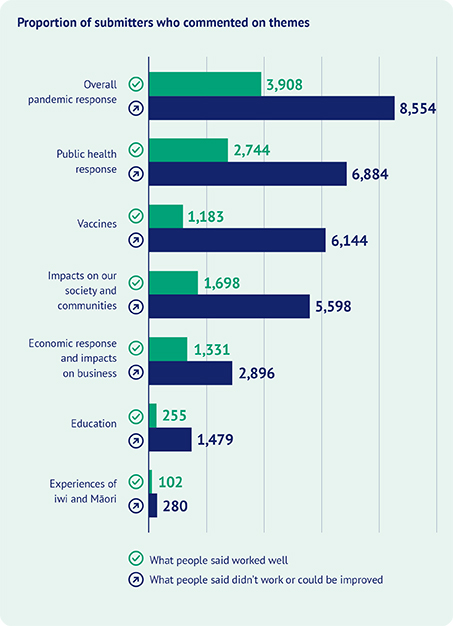Our approach Te huarahi i whāia e mātau
A focus of the Inquiry’s work was to hear directly from people about their experiences of the COVID-19 pandemic, to help inform Aotearoa New Zealand’s planning for any future pandemics.
We considered it necessary that the Inquiry heard from as many people as possible (and from as many different backgrounds as possible), to properly address our terms of reference.
To support this, the Inquiry ran a public submissions process for six weeks, between 8 February and 24 March 2024, where people could complete an online survey through our website.
We asked people to respond to two open-ended questions:
Looking back – what would you like the Inquiry to know about your experiences of the COVID-19 pandemic?
Moving forward – what lessons should we learn from your experiences so we can be as prepared as possible for a future pandemic?
All survey material was available in English, Te Reo Māori and New Zealand Sign Language, and translated survey material was available in Simplified Chinese, Hindi, Tongan and Samoan. We ensured the online survey was accessible for disability communities, and people could provide their responses over the phone through an 0800 number if they couldn’t access or use the website.
People could make a submission as an individual, or on behalf of their whānau (family), or an organisation. People could also choose to provide demographic information alongside their feedback, and we’ve used this information to help highlight the different types of people and communities who shared their experiences with us.
We worked with external partners to hold a range of community-based engagements, including with secondary and tertiary students, workers, volunteers, business owners, older people, disabled people, people from rainbow communities, ethnic communities and refugees, and prisoners in order to gather submissions from harder to reach communities. We received about 450 submissions this way.

We were pleased to receive almost 13,000 submissions during the six weeks the survey was open.
Every submission was read and categorised into corresponding themes and topics by a specialist team of analysts over a 12-week period. This was followed by a synthesis of all the points made, which was considered by Commissioners and used to inform this summary experiences report.
Confidentiality, privacy and use of quoted material | Matatapu, tūmataiti me te whakamahi i ngā kōrero a te tangata
When completing the survey, people were able to request that their responses be kept permanently confidential. We have not used any quoted material in this report where this request has been made, without prior permission.
Where quotes are used, we have removed all personal information so that only unattributed, unidentifiable material is included. In some cases, this means we have edited text to protect people’s privacy.
We have also applied editorial consistency to quoted material to ensure quotes are easy to read and removed any offensive language.
Most frequently covered topics | Ngā tino take kua kōrerotia
The aim of this report is to share a summary of the many experiences and views people shared with the Inquiry relating to their pandemic experience, and the lessons they learned.
As such, we have not provided detailed information about the numbers of submitters who commented on each individual topic. However, the table above provides information on the number of people who provided feedback on broad topic areas.
Note: as our survey questions were open-ended, submitters could provide feedback on multiple topics that were important to them. Therefore, individual submissions often contained feedback on a range of topics – but not on all topics.
Out of scope feedback | Ngā whakaaro i waho o te kaupapa
Many submitters provided feedback on topics that are outside of the Inquiry’s Phase One terms of reference.
While this material cannot contribute to the findings, lessons or recommendations of the Inquiry and has not been included in our Phase One report, we wish to acknowledge the experiences and views of the COVID-19 pandemic that were important to the people who chose to contribute to the Inquiry.
You can read a short summary about the out of scope feedback we received.
This report has been created to help demonstrate the many different experiences and views that were shared with the Inquiry during our public submissions process in early 2024. While we have aimed to provide a comprehensive overview, it does not represent a complete record of everything the Inquiry heard, or the proportions in which certain views were expressed.
It’s also important to note that the content within this report is not representative of all COVID-19 pandemic experiences in Aotearoa New Zealand, or all views on the pandemic response: the feedback we received only represents the experiences and views expressed by those who chose to complete the survey.
The views and experiences reflected in this report are not the views or recommendations of the Inquiry, Commissioners or the New Zealand Government. The Inquiry and the Government accept no responsibility for the accuracy or completeness of any material contained in the responses.

